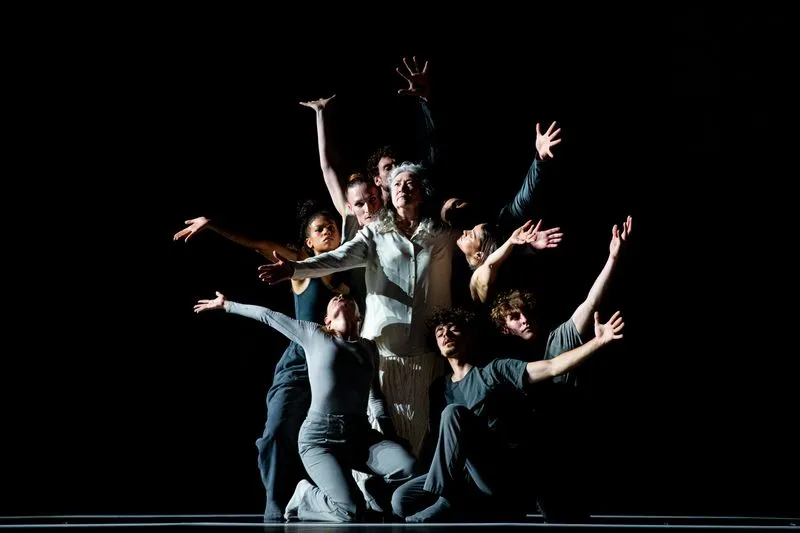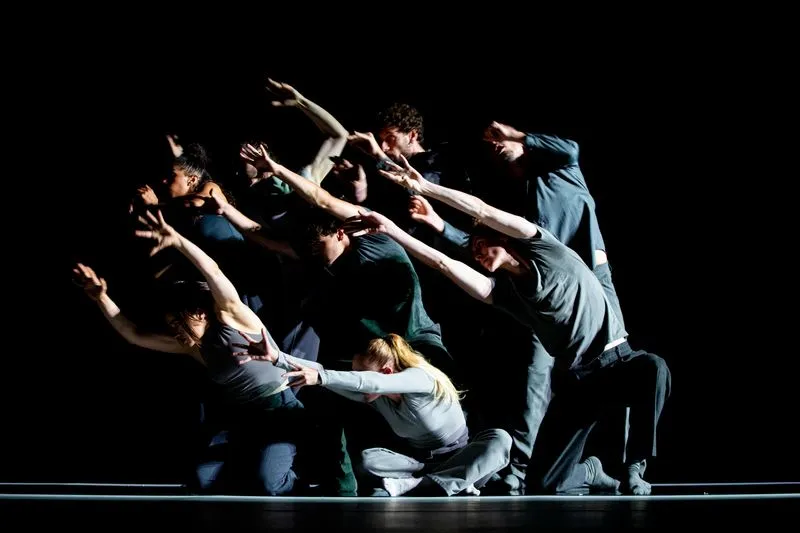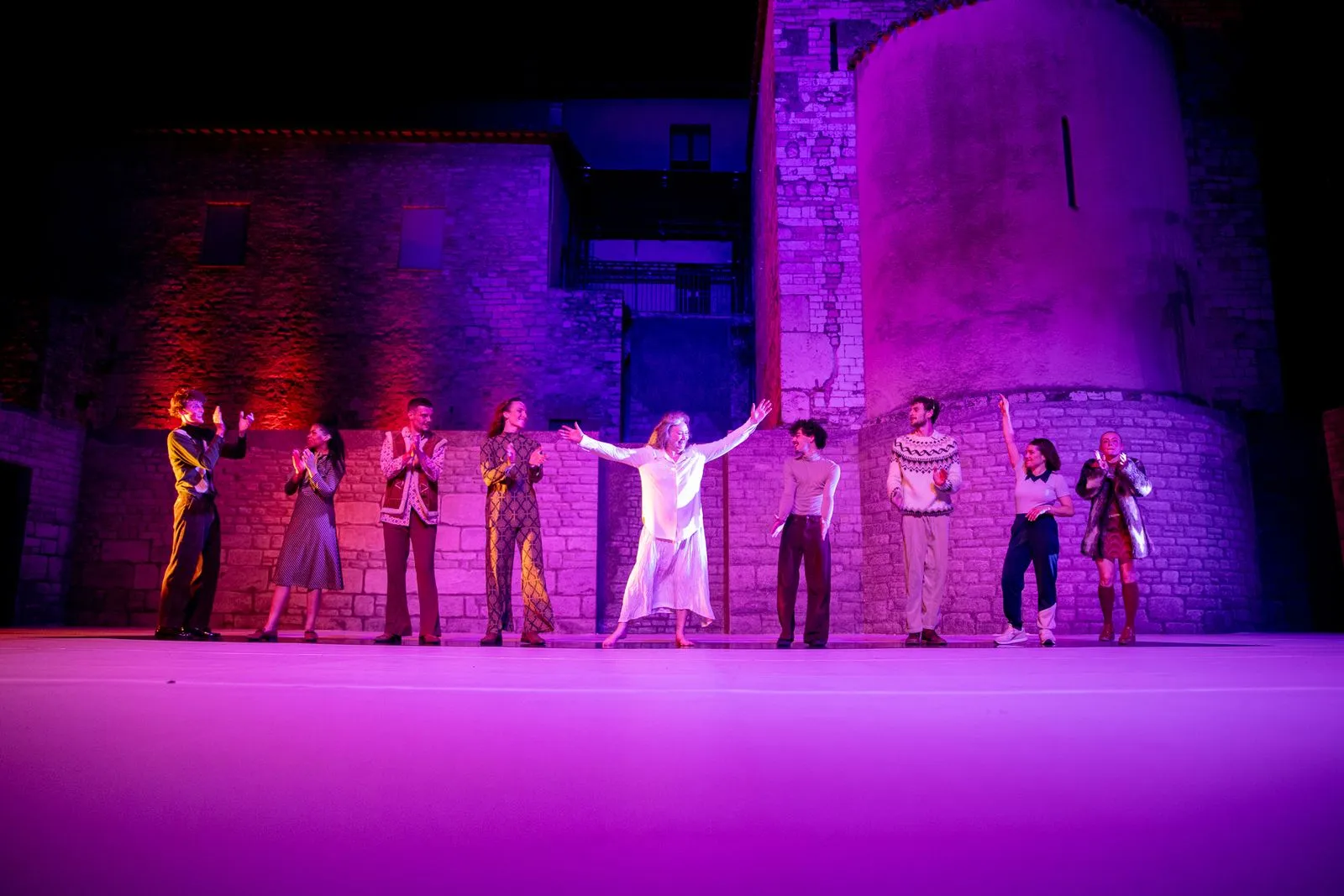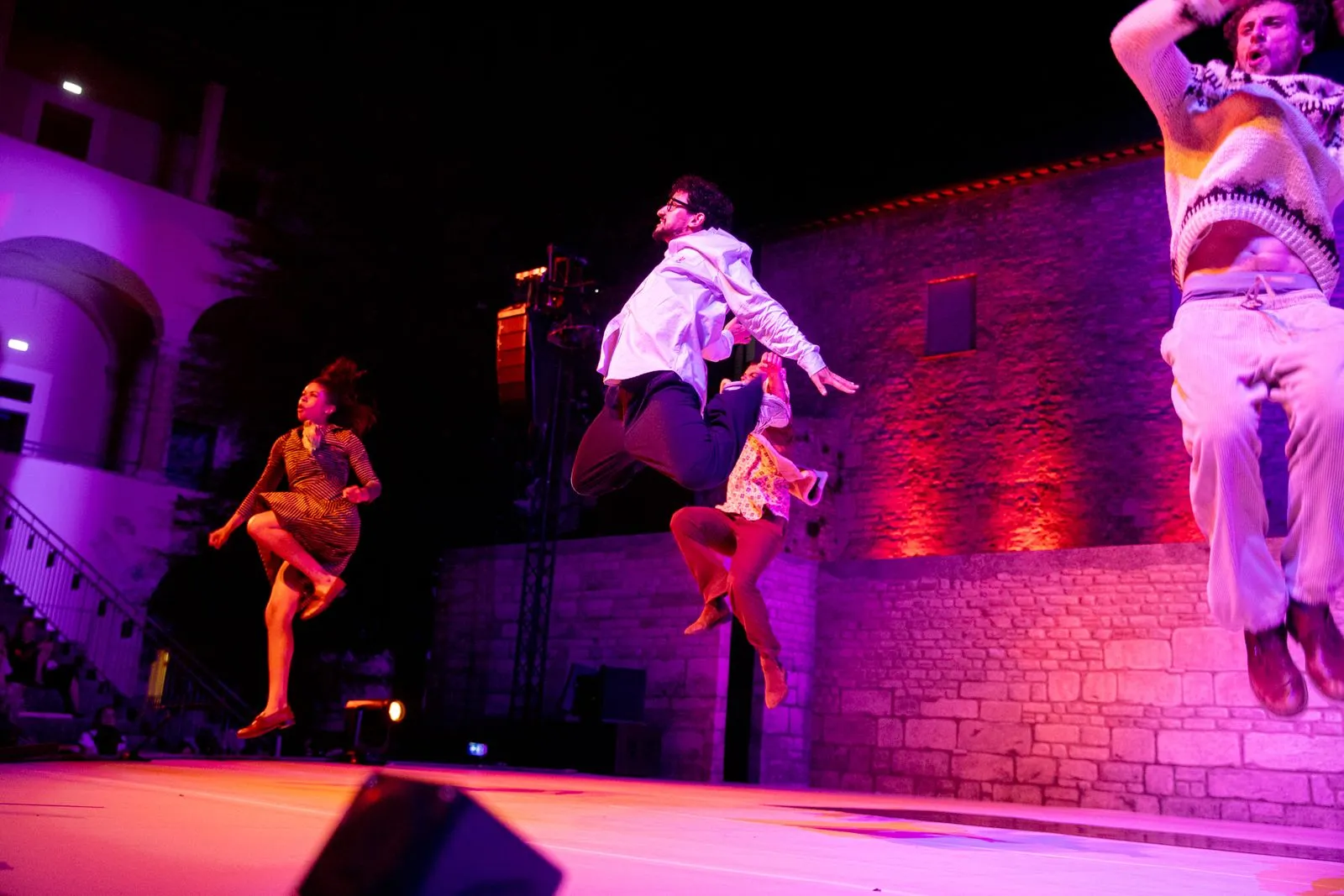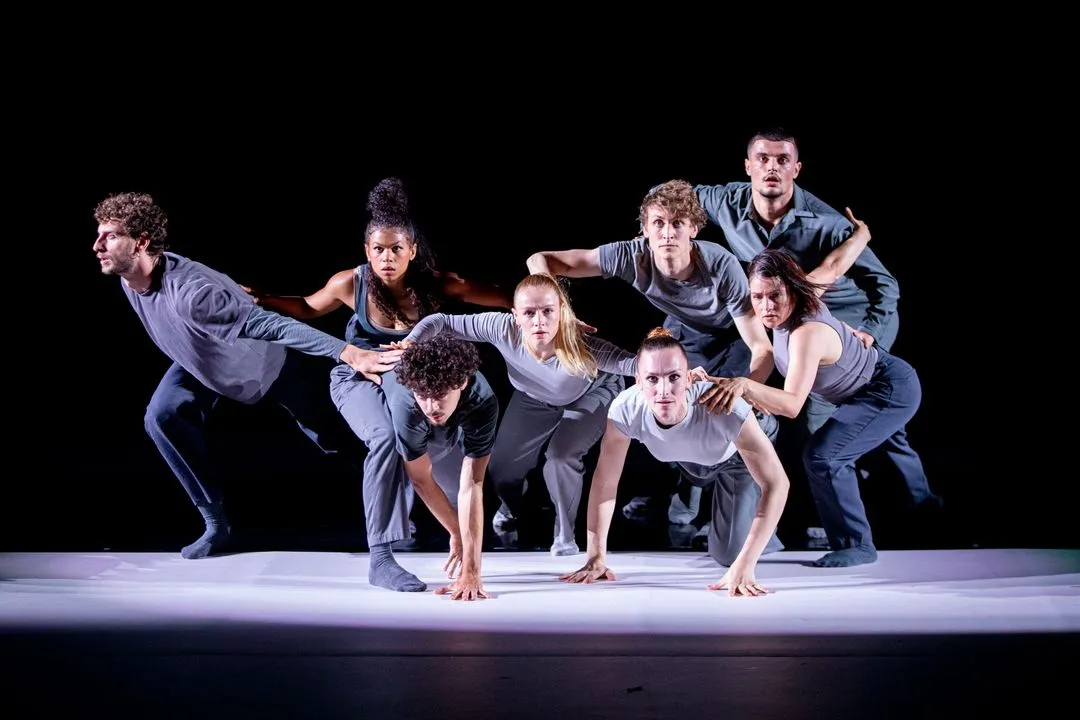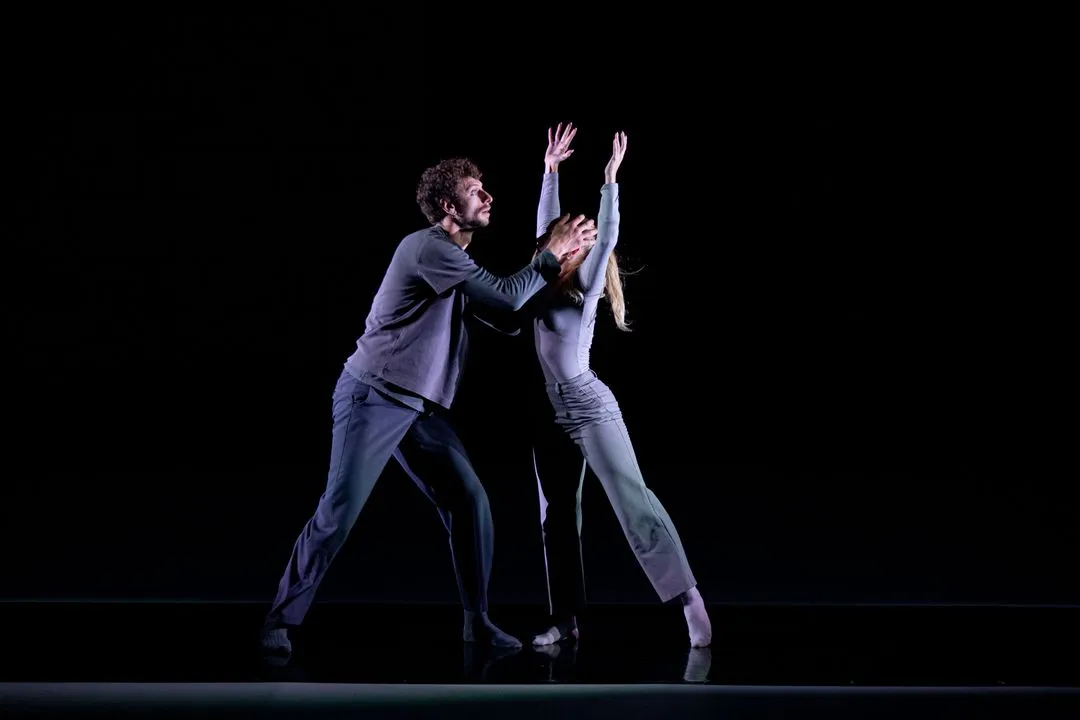

.webp)
Mehdi Kerkouche
PORTRAIT
PORTRAIT
Synopsis
PORTRAIT, the new production by international dance talent Mehdi Kerkouche, explores intra-family relationships through highly expressive tableaux tinged with burlesque. After DABKEH, a work about group balance between broken bonds and reconciliation, and ET SI on the theme of survival and support among pack members, Kerkouche continues his research on group forms in a black-and-white family portrait.
Happy, uncomfortable, toxic, absent family. How does one escape it or, conversely, how is it possible to take refuge in it? How to assert one's individuality in a family one has not chosen?
Powerful, fluid and vibrant, Kerkouche's dance masterfully brings together young artists from from diverse backgrounds - hip hop, street jazz, cabaret, contemporary circus - and blends styles, abetted by a spellbinding electro-pop soundtrack by from Lucie Antunes.
On stage, a tribe of bodies coexist perfectly without ever touching, until, at times, to freezing like old family portraits. Bonds evolve, personalities emerge as the sequences unfold, in solo, duet or ensemble form. Then the picture comes to life, revealing the truth about the characters: behind the frame, they all experience the same ups and downs, joys, sorrows, losses and happiness.
Dancer, actor, singer, director, Mehdi Kerkouche works as a choreographer and director on numerous television programs in France and Europe. From film to fashion, he trains artists from all horizons and directs the staging of major cultural events. In 2017, he created the EMKA company, involving artists known from his previous projects for new creations that blend energy and poetry.
Credits
Programma
choreography Mehdi Kerkouche
choreography assistant Alexandra Trovato
music Lucie Antunes
lights Judith Leray
scenes Mehdi Kerkouche, Judith Leray
costumes Guillaume Boulez with Patrick Cavalié and Céline Frécon
makeup Sabine Leib
voice coaching Nathalie Dupuy
stage director / sound Frédéric Valtre
with (alternating) Micheline Desguin, Matteo Gheza, Jaouen Gouevic, Lisa Ingrand Loustau, Matteo Lochu, Sacha Neel, Amy Swanson, Kilian Vernin, Titouan Wiener Durupt
production Centre chorégraphique national de Créteil et du Val-de-Marne | EMKA
co-production Festival Suresnes Cités Danse 2023
with the support of Cités Danse Connexions / Théâtre- Sénart, scène nationale / Chaillot - Théâtre national de la Danse / Visages du monde, Cergy / L'Archipel, Scène nationale de Perpignan
residencies Théâtre de Suresnes Jean Vilar / Visages du Monde - Cergy / l'Avant Seine - Théâtre de Colombes / Chaillot - Théâtre national de la Danse
PORTRAIT is subsidized by the DRAC of Île-de-France
Italian premiere




INFORMATION
Strobe lights will be used during the performance, which could disturb people with from epilepsy or photosensitivity.
Holders of one or more tickets for the shows staged at Teatro Romano can pick up a corresponding number of tickets for free admission to the National Archaeological Museum and Teatro romano in Spoleto at:
- Festival Box Office & Merchandising via Saffi, 12 - open daily 10am-1pm/15pm-6pm, from June 24 at 10am-7pm
- Festival Box Office Teatro Nuovo Gian Carlo Menotti via Vaita Sant'Andrea, 10 - open from June 28 daily 10 a.m.-1 p.m.-4 p.m.
- Spoleto Festival Information Point Piazza della Libertà - open from June 28 daily 10 a.m. - 1 p.m. - 3 p.m. - 6 p.m.
- Theater ticket offices open to leave from one hour before the start of performances
__
Please be advised that dates and times may be subject to change.
See www.festivaldispoleto.com for updates.
Program
Mehdi Kerkouche. A contemporary fairy tale
Text by Valeria Crippa
From commercial dance for French television to the Ballet de l'Opéra de Paris. Mehdi Kerkouche's irresistible rise has the strong taste of a contemporary fairy tale redemption. This is admitted by the French dancer and choreographer himself, director since January 2023 of the Centre Chorégraphique Nationale de Créteil et du Val-de-Marne, aware that he has deployed his talent for dance far beyond the usual cultural fences that separate entertainment and theatrical institutions, thanks to a lucky twist of fate and the complicity of social media. A passion discovered from as a child, watching video clips of Michael Jackson and Janet Jackson, Prince, Britney Spears: "I come from from a very simple family" - says Kerkouche, thirty-eight - "we didn't have the means to go to theater. Culture for us was television: I started to dancing by copying everything that was on TV. Seeing my dogged enthusiasm, my mother enrolled me to a dance class."
Born to Paris from a family of Algerian origin, the author grew up in the dialogue between French and Arab culture: "In my childhood there was much more tolerance for diversity than in today's fragmented, label-divided society. Before, it was easier to coexist in suburban neighborhoods where everything mixed: Jews and Arabs, blacks and whites, together without problems. I experienced this dual culture as a great richness that continues to to inspire my creations even in subtle ways. The differences have blended into me." Eclecticism is the artistic hallmark of Kerkouche, who began to working as a choreographer and director of television programs in France and Europe, in the world of musicals, film, and fashion, forging important collaborations with Céline Dion and Christine and the Queens, making his big-screen debut as a performer, in the role of Karim, in Ladislas Chollat's first feature film, the 2019 musical comedy Let's Dance. In parallel, Kerkouche devotes himself to teaching at the Académie Internationale De La Danse (AID), Studio Harmonic and Lax Studio in Paris.
In 2017 he founded his company EMKA (a name inspired by his initials), for which he signed Dabkeh the following year, in which he revisits powerful and festive Middle Eastern dance with a contemporary gaze. "In Dabkeh I reconnected with the Arab origins of dance and music"-the choreographer explains. "Dabkeh is my favorite style of traditional Arab dance, it is very much practiced today in Iraq, Lebanon, Palestine: originally it was a dance of warriors celebrating victory, clapping their hands and shouting, today it is performed in festivals, celebrations, weddings. I wanted to repropose it in a totally contemporary universe." For Kerkouche, dance is celebration and sharing. Even during the distancing-confining pandemic, a period that played a key role in the Parisian choreographer's professional rise: in 2020, the video of his choreography Confinected to the tune of Barry White's You are the First, the Last, My Everything - an ironic mosaic of five dancers, including Mehdi himself, whose bodies seem to playfully merge between the couches of their respective homes - reached four million views and became a viral phenomenon. "The Covid period was also very complicated for us dancers," he recalls. "I was confined to the house, like everyone else, and I was racking my brain to figure out what might be a way to stay in business: none of us knew when we would be back to dancing. I then began to teaching classes online, with Instagram feeds, and the public immediately responded: they found me "cool" and positive." This media overexposure, which he did not initially realize, acted from bright propeller of his notoriety among the general public. From "confined videos," then, to the On danse chez vous festival, an event that brought together seventy dancers and choreographers on social networks for a to fundraiser to benefit health workers during the pandemic. An initiative that attracted the attention of the then director of the Ballet de l'Opéra de Paris Aurélie Dupont, who commissioned to Kerkouche to create ET SI on the theme of survival in a community, included in an unprecedented program signed from four authors (the other choreographers were Sidi Larbi Cherkaoui, Tess Voelker, Damien Jalet), danced by the Opéra dancers and broadcast on streaming and prime-time French TV, in November 2020.
After that consecration, so here is PORTRAIT, Mehdi Kerkouche's new production invited by Festival dei Due Mondi in Spoleto: to original electro-pop music composed from Lucie Antunes, it places human relationships aggregated in different family forms and translated into a constant articulation of choreographic modules, from solos to duets to ensembles, at the center of the scene. It is a portrait that is transgenerational meet-and-greet: "I developed the idea of bringing together on stage a group of people who have not chosen each other, but who constitute a whole in which emotions are constantly evolving"-the choreographer says. "As in any family, you can harbor deep anger toward someone and the next day feel the need to hug them back, because that person remains your mother, your father, or a fundamental reference in your life. Then there is the "family of the heart," the one that each of us builds beyond blood ties. These two types of family cohabit in everyone's life." The choreography of PORTRAIT - produced by the Centre Chorégraphique Nationale de Créteil et du Val-de-Marne and from EMKA, presented at the Théâtre National de Chaillot in Paris in 2023 - unfolds to starting from an oscillation that propagates from the individual to the group, deconstructs and restructures, in the ecumenical convergence of multiple dance styles, a fundamental element of Kerkouche's artistic vision: "At the basis of the creative process for me is music"-she says-"and in PORTRAIT everything revolves around to an Elton John song, Curtains, which I love very much: I built a kind of full-length film and asked composer Lucie Antunes for a soundtrack on which I began to improvising with the performers. My dancers range in age from twenty to sixty-seven and come from from all possible universes of art: contemporary dance, hip hop, break dance, cabaret, Isadora Duncan's free dance. My goal is to try to bring individual individualities together on one stage in a powerful way by finding meeting points between different languages." Kerkouche strongly believes in the aggregating capacity of dance: "Dance belongs to the most beautiful moments in life: parties, weddings, celebrations. So it can touch people, from the most informed spectators to those totally unfamiliar. from director of the National Choreographic Center in Créteil I take up the challenge of creating in France, where the dance system is very segmented, a bridge between contemporary and ballet, flamenco and street dance, and in the widest possible spectrum, from museums to contemporary circus."
Dates & Tickets
Playlist
Biographies
After a childhood spent in television and pictures, a stage enthusiast especially of musicals, he began his career as a professional dancer before the age of eighteen. His experience as a performer confirmed his vocation as a choreographer. He shares this passion by teaching at Académie Internationale De La Danse (AID), Studio Harmonic, and Lax Studio in Paris. Since 2017 he has been expanding his company EMKA, a faithful mainstay of his projects, with the desire to "connect different bodies and styles through an energetic and poetic body language." During the first lockdown, his expressiveness and artistic strength earned him viral success on social media. In the fall of 2020, he is invited from Aurélie Dupont to to choreograph ET SI for the Ballet de'Opera in Paris, after which Chaillot - Théâtre national de la Danse hosted the third edition of its On Danse Chez Vous festival. from January 2023, Mehdi Kerkouche took over as director of the National Choreographic Center (CCN) in Créteil.


